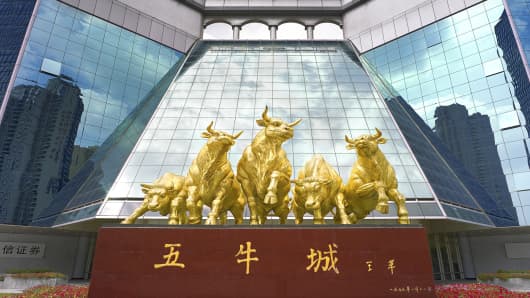Despite a 10 percent correction in mainland equities over the past two months, driven by a slew of concerns from Beijing's crackdown on property speculation to rising local government debt levels, China market bulls are not giving up hope, forecasting gains of up to 15 percent in the coming months.
The world's second largest economy's disappointing first quarter gross domestic product (GDP) growth of 7.7 percent, coupled with benign inflation, is lessening the risk of policy tightening that has been weighing on the market, say strategists.
(Read More: Has China's Economy Hit a 'Dead End'?)
"People were pricing in tightening risks and hence there is a discount in [stock market] valuation. With slower growth and lower than expected inflation, that risk is being pushed out. [While] sentiment is pessimistic, this is the better time for entry," said Wendy Liu, head of China equity research at Nomura. The country's consumer price index eased sharply in March to 2.1 percent from 3.2 percent in the previous month.
Liu, who sees April and May as the "bottom" for the market, forecasts up to 15 percent upside for the MSCI China in the months following.
"You should see signs of a fairly resilient property market, the wealth management product pipeline coming back post the scrutiny and then other investment driven growth in the coming months," she added. China's heavyweight financial stocks have been under pressure in recent weeks after banks last month were ordered to tighten control over wealth management products and improve transparency.
(Read More: China January to March FDI at $29.9 Billion, Up 1.44% Year-on Year)
In addition, there is a possibility the government could step up fiscal spending to limit downside risks to growth, according to market participants.
"If you look at what they have done on the property sector and the banking sector, with renewed curbs on wealth management products, clearly the only lever left for them to pull is still on the infrastructure spending side," said Steven Sun, head of China equity strategy at HSBC, who sees more than 14 percent upside for the benchmark Shanghai Composite by the year-end.
With a 2013 budget deficit target of 2 percent of GDP, the government has room to increase infrastructure spending this year, he said, on top of the $157 billion infrastructure stimulus package unveiled by Beijing last September to prop up growth.
"Once fiscal spending is delivered, growth should be lifted in the coming quarters," Sun added.
(Read More: Fund Managers Say Goodbye China, Hello Japan)
Reliance on infrastructure investment has been a double edged sword for China's economy. While it has helped to boost economic activity, it has also led to significant amounts of local government debt and excess capacity due to over investment on the back of such stimulus.
This has some strategists including Kelvin Tay, regional chief investment officer, southern Asia-Pacific, UBS Wealth Management cautious on the market. The bank downgraded China to neutral from overweight earlier this month.
(Read More: China March Home Prices Rise for Third Month)
"I think where local government debt is concerned I don't think anybody on the street has a handle on how much debt there is. The fears are real and it's going to be a shadow on the stock market," said Tay.
Last week, rising concerns over elevated debt levels in the world's second largest economy - brought on by the rise of shadow banking - prompted ratings agency Fitch to downgrade China's long-term local currency credit rating to A-plus from AA-minus.



